Equality and Diversity in the Workplace: Research on Tesco PLC
VerifiedAdded on 2023/01/18
|18
|1601
|65
Report
AI Summary
This report examines the implementation of equality and diversity initiatives within Tesco PLC, aiming to assess their effectiveness in fostering an inclusive work environment. The research employs a qualitative methodology, including primary data collection through questionnaires administered to 20 Tesco employees. The study investigates the importance of equality and diversity, the company's promotion strategies, and the challenges encountered in creating an inclusive culture. Key findings reveal that employees perceive equality and diversity as crucial for performance, with a focus on addressing factors such as cultural differences and gender inequality. The report concludes with recommendations, emphasizing the importance of training programs and clear communication strategies to mitigate discrimination and prejudice, thereby promoting a more equitable and productive workplace. The research incorporates a project management plan and Gantt chart to outline the research process, ensuring the study's structured approach and efficient execution.
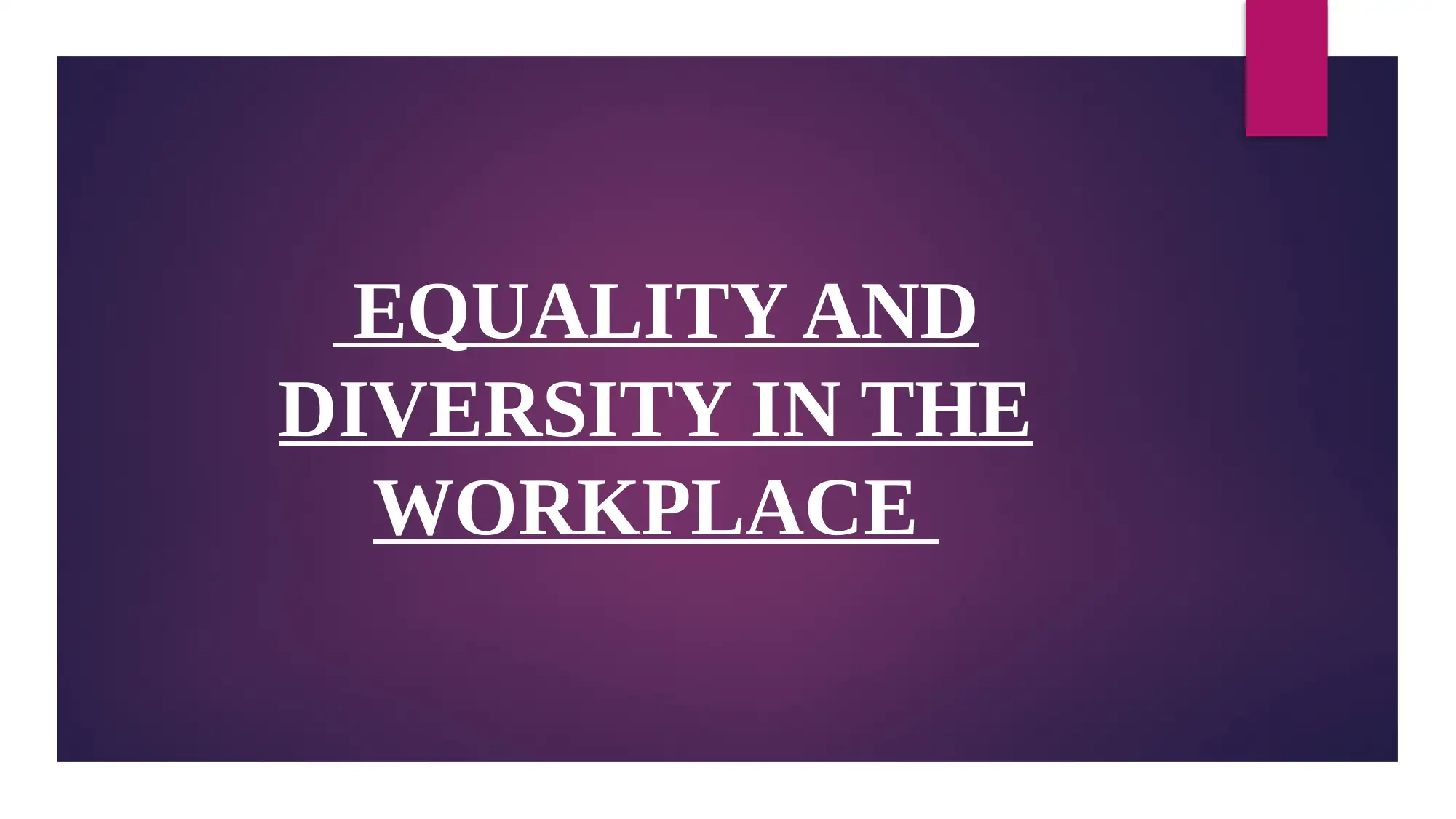
EQUALITY AND
DIVERSITY IN THE
WORKPLACE
DIVERSITY IN THE
WORKPLACE
Paraphrase This Document
Need a fresh take? Get an instant paraphrase of this document with our AI Paraphraser
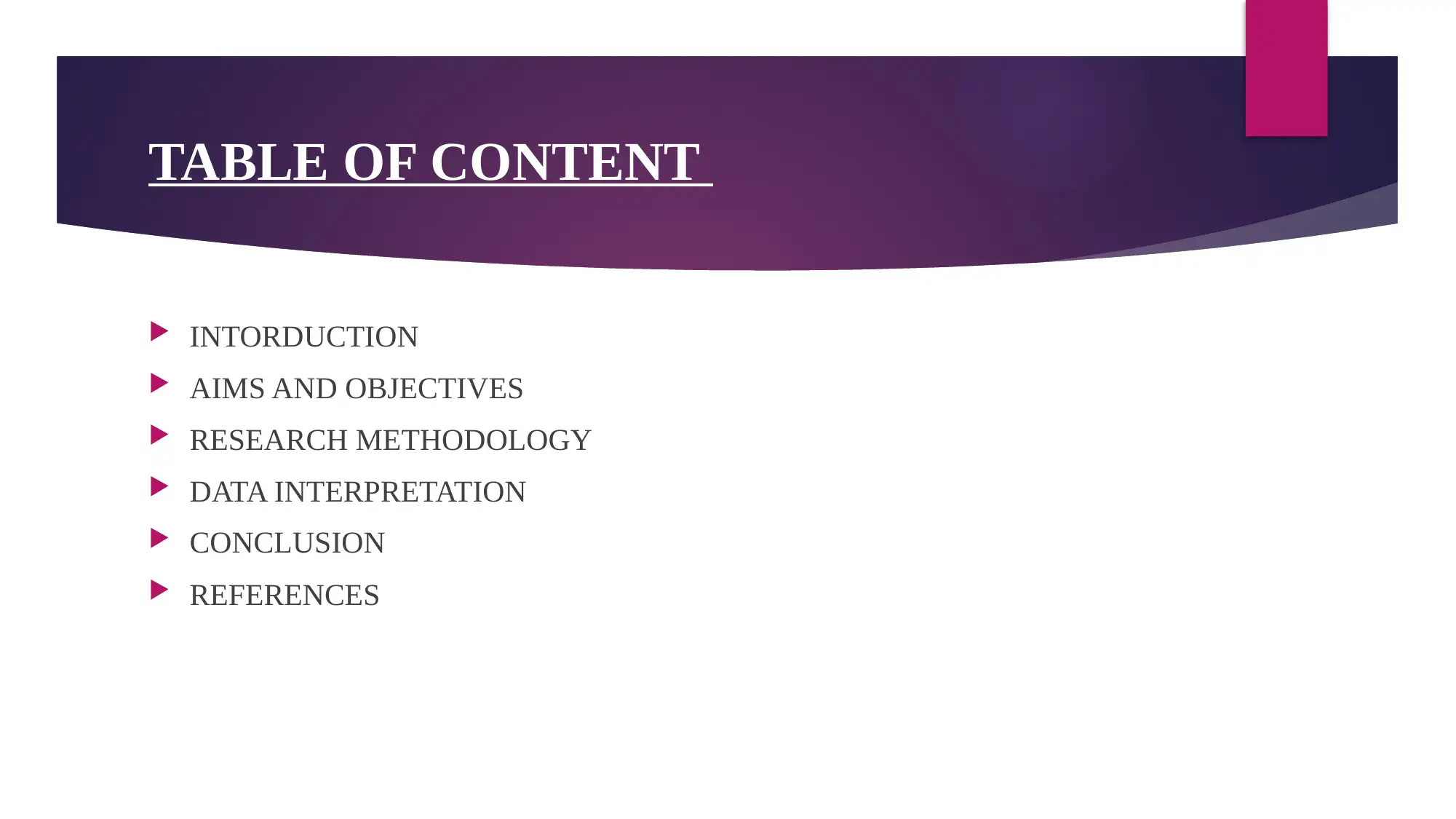
TABLE OF CONTENT
INTORDUCTION
AIMS AND OBJECTIVES
RESEARCH METHODOLOGY
DATA INTERPRETATION
CONCLUSION
REFERENCES
INTORDUCTION
AIMS AND OBJECTIVES
RESEARCH METHODOLOGY
DATA INTERPRETATION
CONCLUSION
REFERENCES
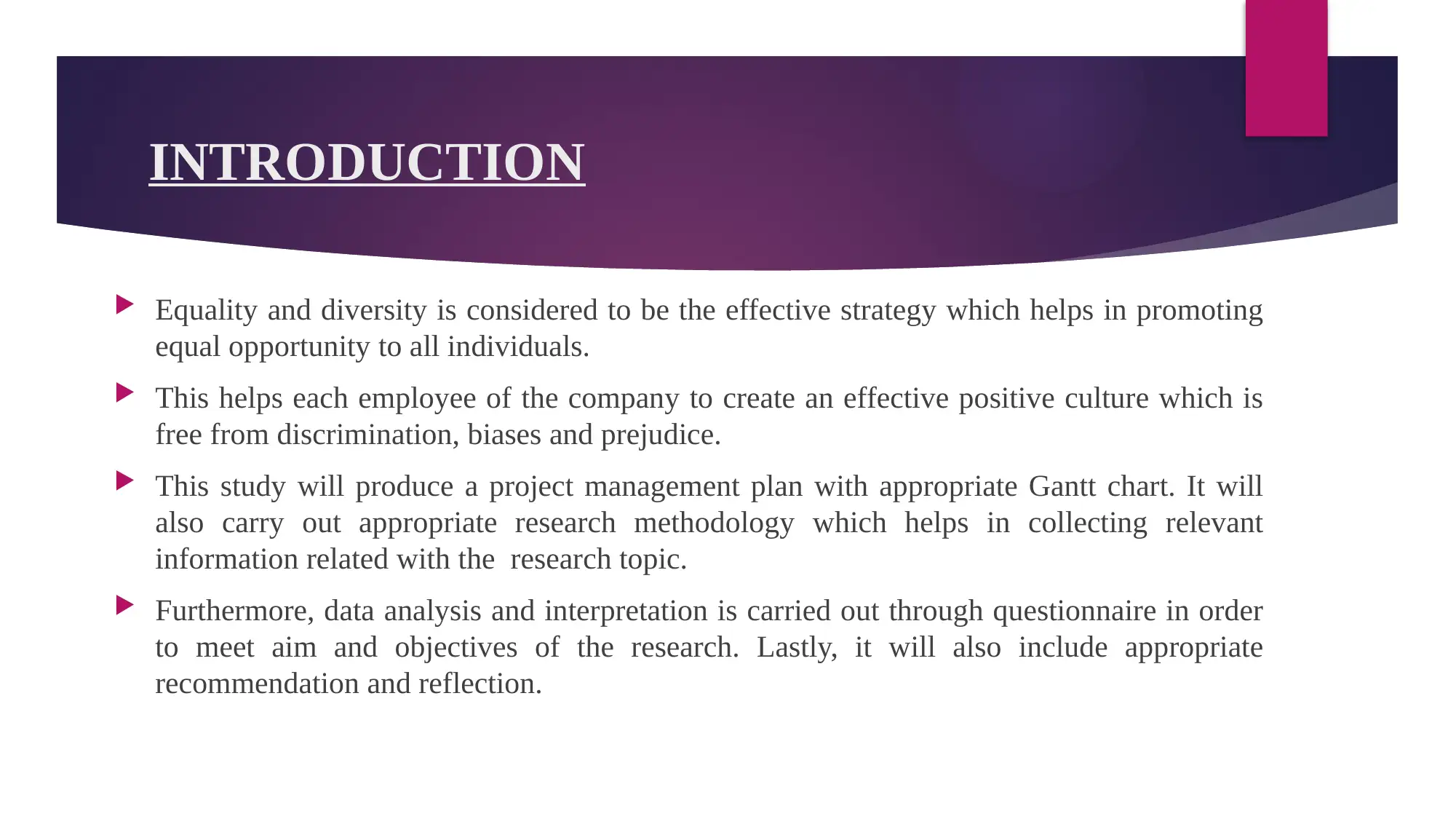
INTRODUCTION
Equality and diversity is considered to be the effective strategy which helps in promoting
equal opportunity to all individuals.
This helps each employee of the company to create an effective positive culture which is
free from discrimination, biases and prejudice.
This study will produce a project management plan with appropriate Gantt chart. It will
also carry out appropriate research methodology which helps in collecting relevant
information related with the research topic.
Furthermore, data analysis and interpretation is carried out through questionnaire in order
to meet aim and objectives of the research. Lastly, it will also include appropriate
recommendation and reflection.
Equality and diversity is considered to be the effective strategy which helps in promoting
equal opportunity to all individuals.
This helps each employee of the company to create an effective positive culture which is
free from discrimination, biases and prejudice.
This study will produce a project management plan with appropriate Gantt chart. It will
also carry out appropriate research methodology which helps in collecting relevant
information related with the research topic.
Furthermore, data analysis and interpretation is carried out through questionnaire in order
to meet aim and objectives of the research. Lastly, it will also include appropriate
recommendation and reflection.
⊘ This is a preview!⊘
Do you want full access?
Subscribe today to unlock all pages.

Trusted by 1+ million students worldwide
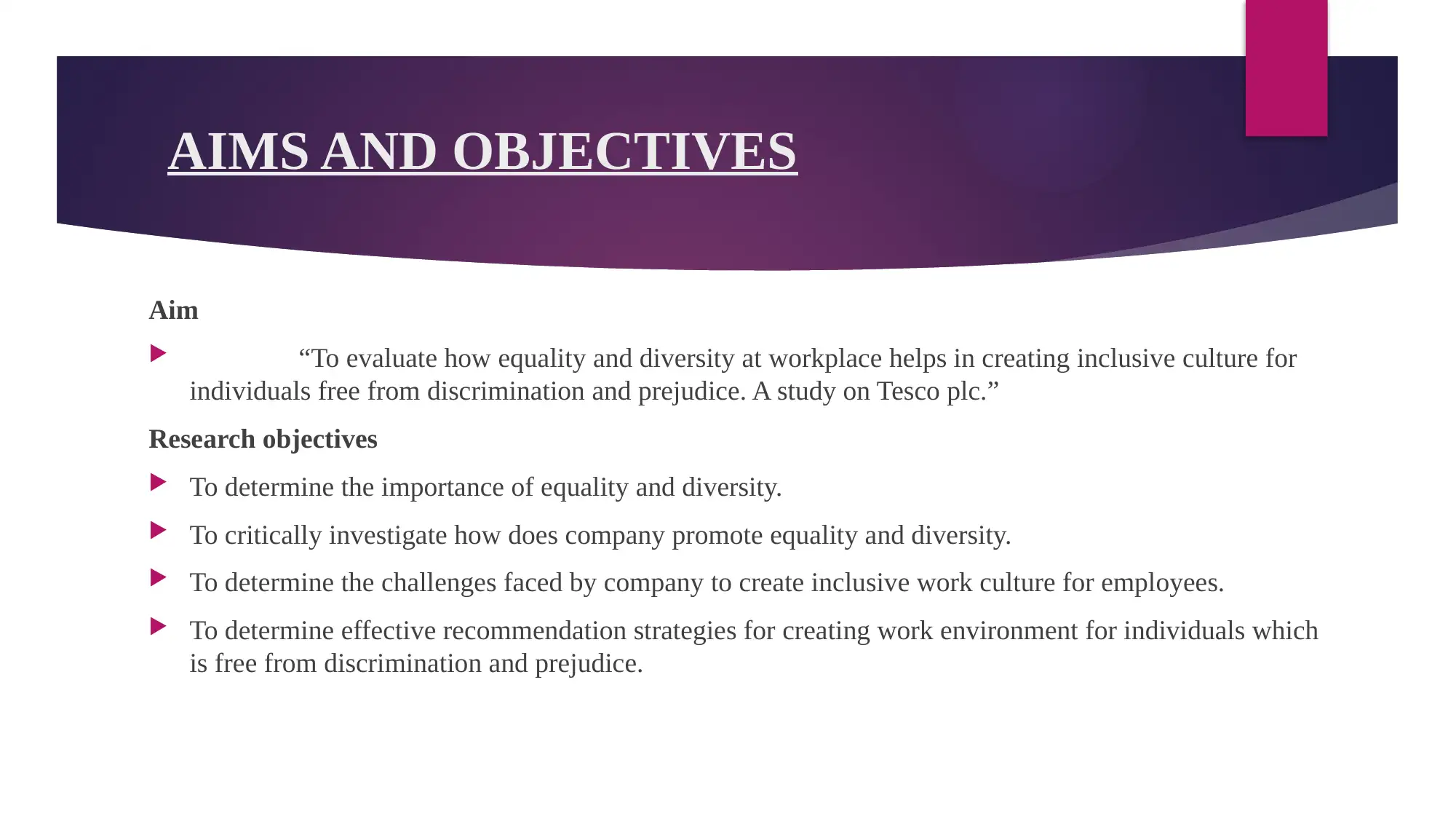
AIMS AND OBJECTIVES
Aim
“To evaluate how equality and diversity at workplace helps in creating inclusive culture for
individuals free from discrimination and prejudice. A study on Tesco plc.”
Research objectives
To determine the importance of equality and diversity.
To critically investigate how does company promote equality and diversity.
To determine the challenges faced by company to create inclusive work culture for employees.
To determine effective recommendation strategies for creating work environment for individuals which
is free from discrimination and prejudice.
Aim
“To evaluate how equality and diversity at workplace helps in creating inclusive culture for
individuals free from discrimination and prejudice. A study on Tesco plc.”
Research objectives
To determine the importance of equality and diversity.
To critically investigate how does company promote equality and diversity.
To determine the challenges faced by company to create inclusive work culture for employees.
To determine effective recommendation strategies for creating work environment for individuals which
is free from discrimination and prejudice.
Paraphrase This Document
Need a fresh take? Get an instant paraphrase of this document with our AI Paraphraser
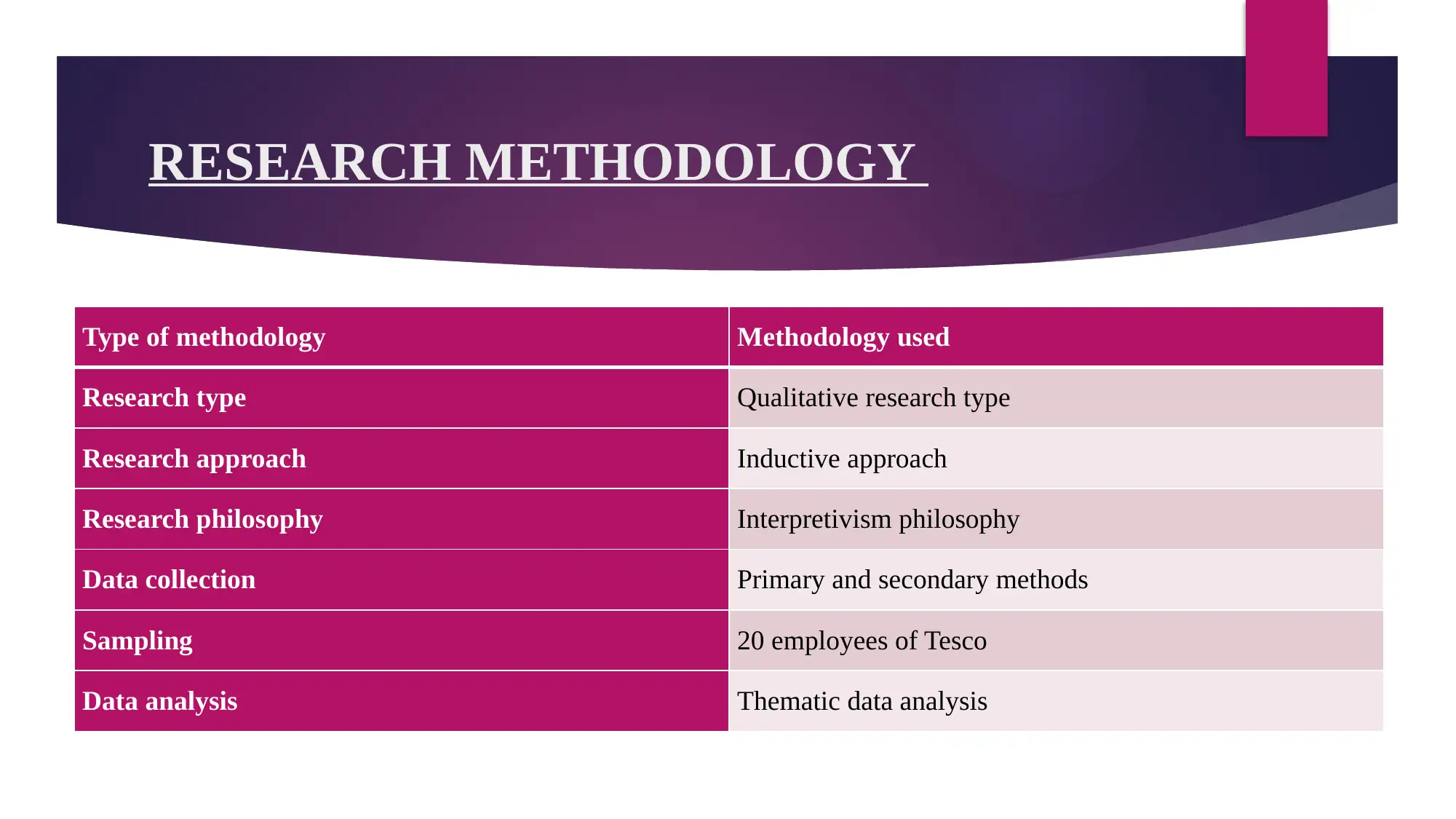
RESEARCH METHODOLOGY
Type of methodology Methodology used
Research type Qualitative research type
Research approach Inductive approach
Research philosophy Interpretivism philosophy
Data collection Primary and secondary methods
Sampling 20 employees of Tesco
Data analysis Thematic data analysis
Type of methodology Methodology used
Research type Qualitative research type
Research approach Inductive approach
Research philosophy Interpretivism philosophy
Data collection Primary and secondary methods
Sampling 20 employees of Tesco
Data analysis Thematic data analysis
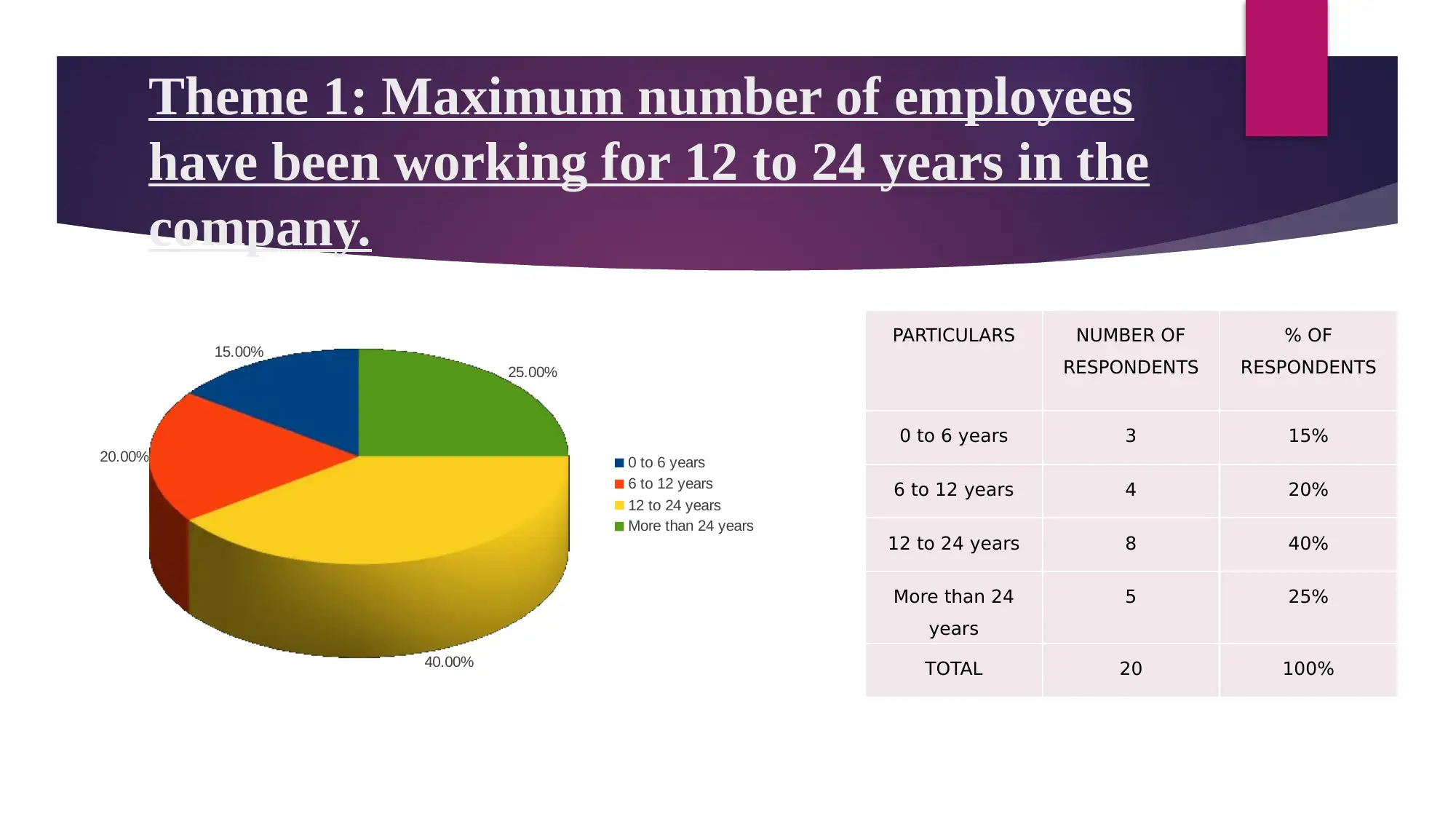
Theme 1: Maximum number of employees
have been working for 12 to 24 years in the
company.
PARTICULARS NUMBER OF
RESPONDENTS
% OF
RESPONDENTS
0 to 6 years 3 15%
6 to 12 years 4 20%
12 to 24 years 8 40%
More than 24
years
5 25%
TOTAL 20 100%
15.00%
20.00%
40.00%
25.00%
0 to 6 years
6 to 12 years
12 to 24 years
More than 24 years
15.00%
20.00%
40.00%
25.00%
0 to 6 years
6 to 12 years
12 to 24 years
More than 24 years
have been working for 12 to 24 years in the
company.
PARTICULARS NUMBER OF
RESPONDENTS
% OF
RESPONDENTS
0 to 6 years 3 15%
6 to 12 years 4 20%
12 to 24 years 8 40%
More than 24
years
5 25%
TOTAL 20 100%
15.00%
20.00%
40.00%
25.00%
0 to 6 years
6 to 12 years
12 to 24 years
More than 24 years
15.00%
20.00%
40.00%
25.00%
0 to 6 years
6 to 12 years
12 to 24 years
More than 24 years
⊘ This is a preview!⊘
Do you want full access?
Subscribe today to unlock all pages.

Trusted by 1+ million students worldwide
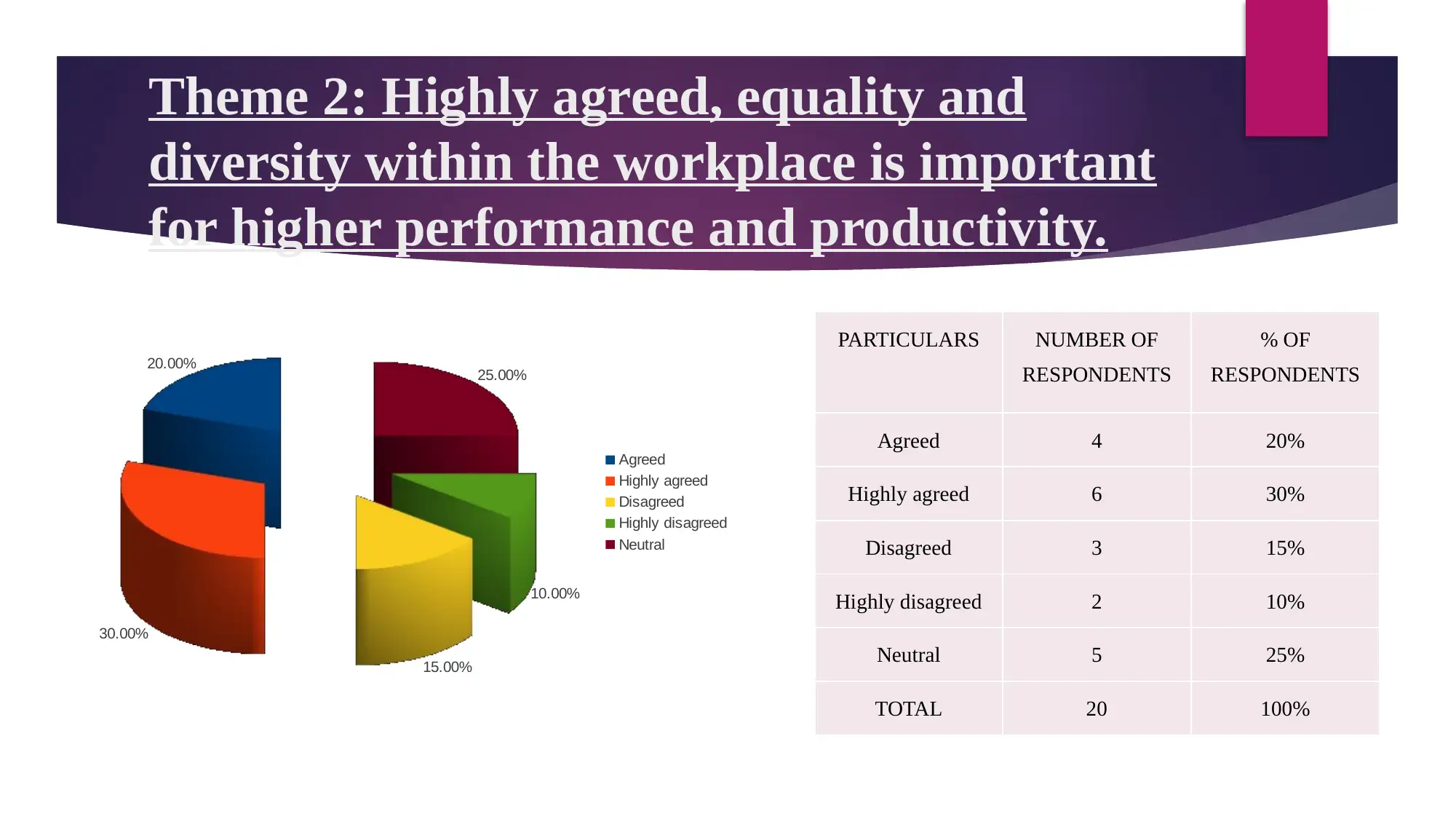
Theme 2: Highly agreed, equality and
diversity within the workplace is important
for higher performance and productivity.
PARTICULARS NUMBER OF
RESPONDENTS
% OF
RESPONDENTS
Agreed 4 20%
Highly agreed 6 30%
Disagreed 3 15%
Highly disagreed 2 10%
Neutral 5 25%
TOTAL 20 100%
20.00%
30.00%
15.00%
10.00%
25.00%
Agreed
Highly agreed
Disagreed
Highly disagreed
Neutral
20.00%
30.00%
15.00%
10.00%
25.00%
Agreed
Highly agreed
Disagreed
Highly disagreed
Neutral
diversity within the workplace is important
for higher performance and productivity.
PARTICULARS NUMBER OF
RESPONDENTS
% OF
RESPONDENTS
Agreed 4 20%
Highly agreed 6 30%
Disagreed 3 15%
Highly disagreed 2 10%
Neutral 5 25%
TOTAL 20 100%
20.00%
30.00%
15.00%
10.00%
25.00%
Agreed
Highly agreed
Disagreed
Highly disagreed
Neutral
20.00%
30.00%
15.00%
10.00%
25.00%
Agreed
Highly agreed
Disagreed
Highly disagreed
Neutral
Paraphrase This Document
Need a fresh take? Get an instant paraphrase of this document with our AI Paraphraser
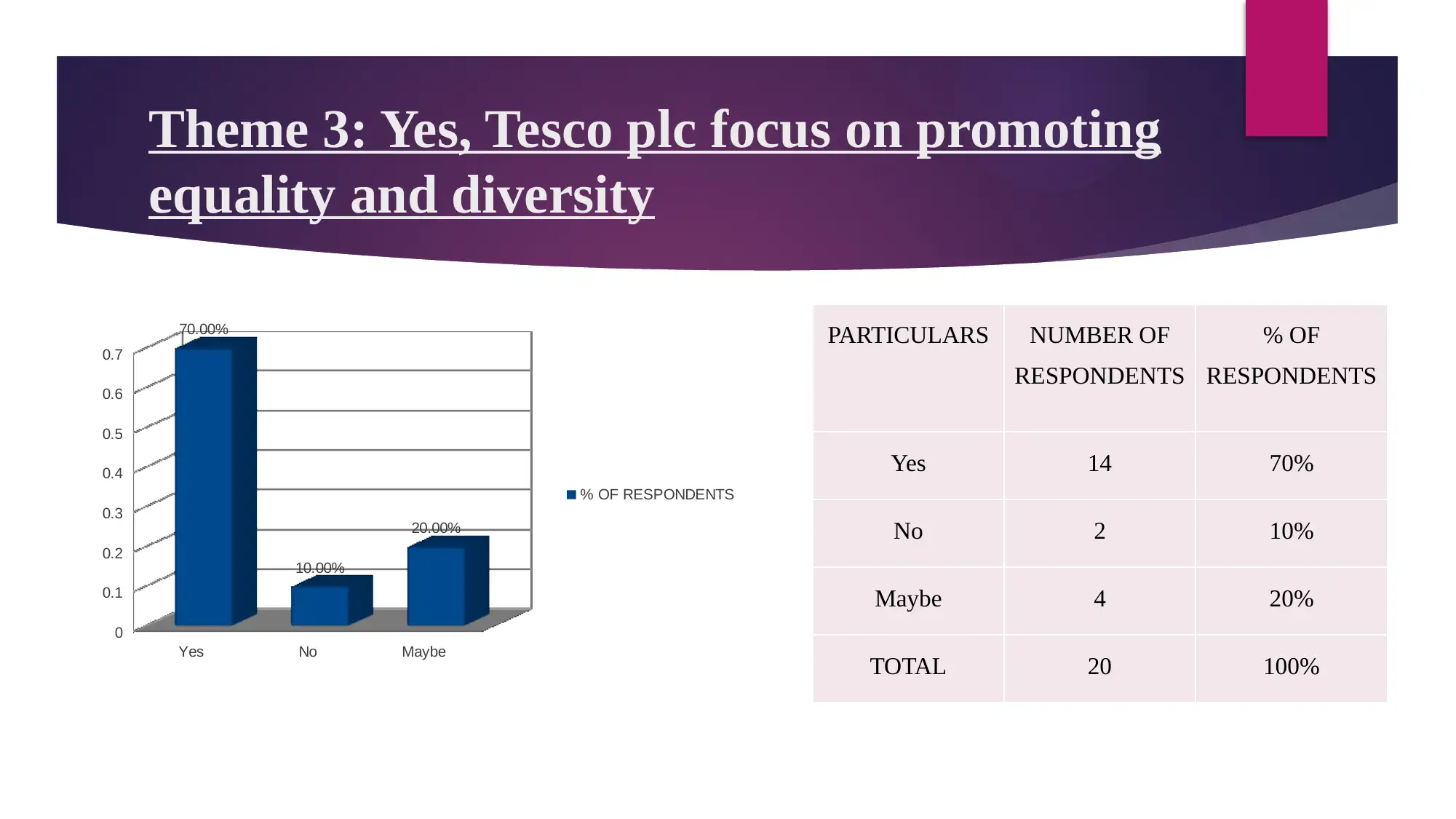
Theme 3: Yes, Tesco plc focus on promoting
equality and diversity
PARTICULARS NUMBER OF
RESPONDENTS
% OF
RESPONDENTS
Yes 14 70%
No 2 10%
Maybe 4 20%
TOTAL 20 100%
Yes No Maybe
0
0.1
0.2
0.3
0.4
0.5
0.6
0.7
70.00%
10.00%
20.00%
% OF RESPONDENTS
Yes No Maybe
0
0.1
0.2
0.3
0.4
0.5
0.6
0.7
70.00%
10.00%
20.00%
% OF RESPONDENTS
equality and diversity
PARTICULARS NUMBER OF
RESPONDENTS
% OF
RESPONDENTS
Yes 14 70%
No 2 10%
Maybe 4 20%
TOTAL 20 100%
Yes No Maybe
0
0.1
0.2
0.3
0.4
0.5
0.6
0.7
70.00%
10.00%
20.00%
% OF RESPONDENTS
Yes No Maybe
0
0.1
0.2
0.3
0.4
0.5
0.6
0.7
70.00%
10.00%
20.00%
% OF RESPONDENTS
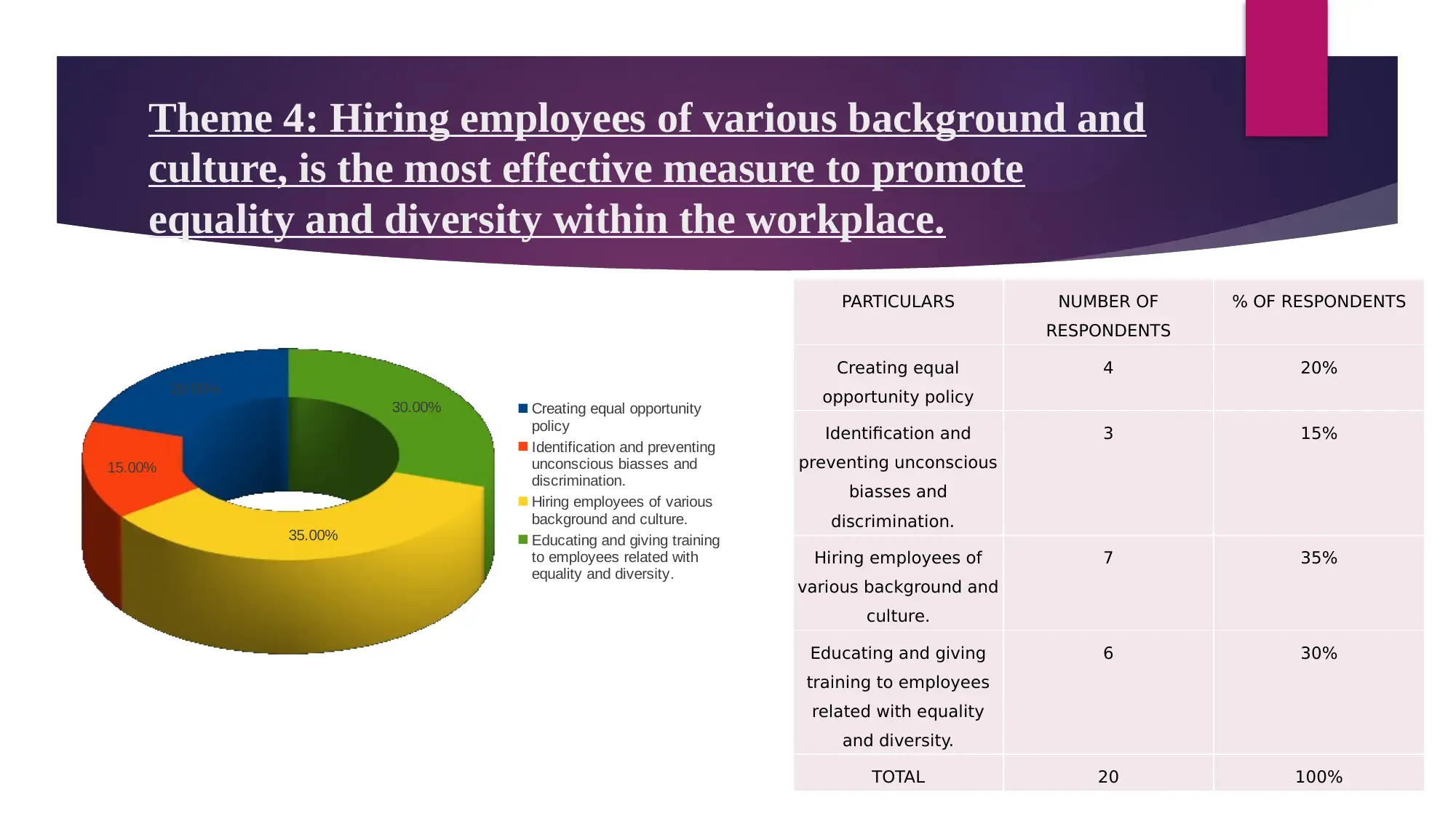
Theme 4: Hiring employees of various background and
culture, is the most effective measure to promote
equality and diversity within the workplace.
PARTICULARS NUMBER OF
RESPONDENTS
% OF RESPONDENTS
Creating equal
opportunity policy
4 20%
Identification and
preventing unconscious
biasses and
discrimination.
3 15%
Hiring employees of
various background and
culture.
7 35%
Educating and giving
training to employees
related with equality
and diversity.
6 30%
TOTAL 20 100%
20.00%
15.00%
35.00%
30.00% Creating equal opportunity
policy
Identification and preventing
unconscious biasses and
discrimination.
Hiring employees of various
background and culture.
Educating and giving training
to employees related with
equality and diversity.
20.00%
15.00%
35.00%
30.00% Creating equal opportunity
policy
Identification and preventing
unconscious biasses and
discrimination.
Hiring employees of various
background and culture.
Educating and giving training
to employees related with
equality and diversity.
culture, is the most effective measure to promote
equality and diversity within the workplace.
PARTICULARS NUMBER OF
RESPONDENTS
% OF RESPONDENTS
Creating equal
opportunity policy
4 20%
Identification and
preventing unconscious
biasses and
discrimination.
3 15%
Hiring employees of
various background and
culture.
7 35%
Educating and giving
training to employees
related with equality
and diversity.
6 30%
TOTAL 20 100%
20.00%
15.00%
35.00%
30.00% Creating equal opportunity
policy
Identification and preventing
unconscious biasses and
discrimination.
Hiring employees of various
background and culture.
Educating and giving training
to employees related with
equality and diversity.
20.00%
15.00%
35.00%
30.00% Creating equal opportunity
policy
Identification and preventing
unconscious biasses and
discrimination.
Hiring employees of various
background and culture.
Educating and giving training
to employees related with
equality and diversity.
⊘ This is a preview!⊘
Do you want full access?
Subscribe today to unlock all pages.

Trusted by 1+ million students worldwide
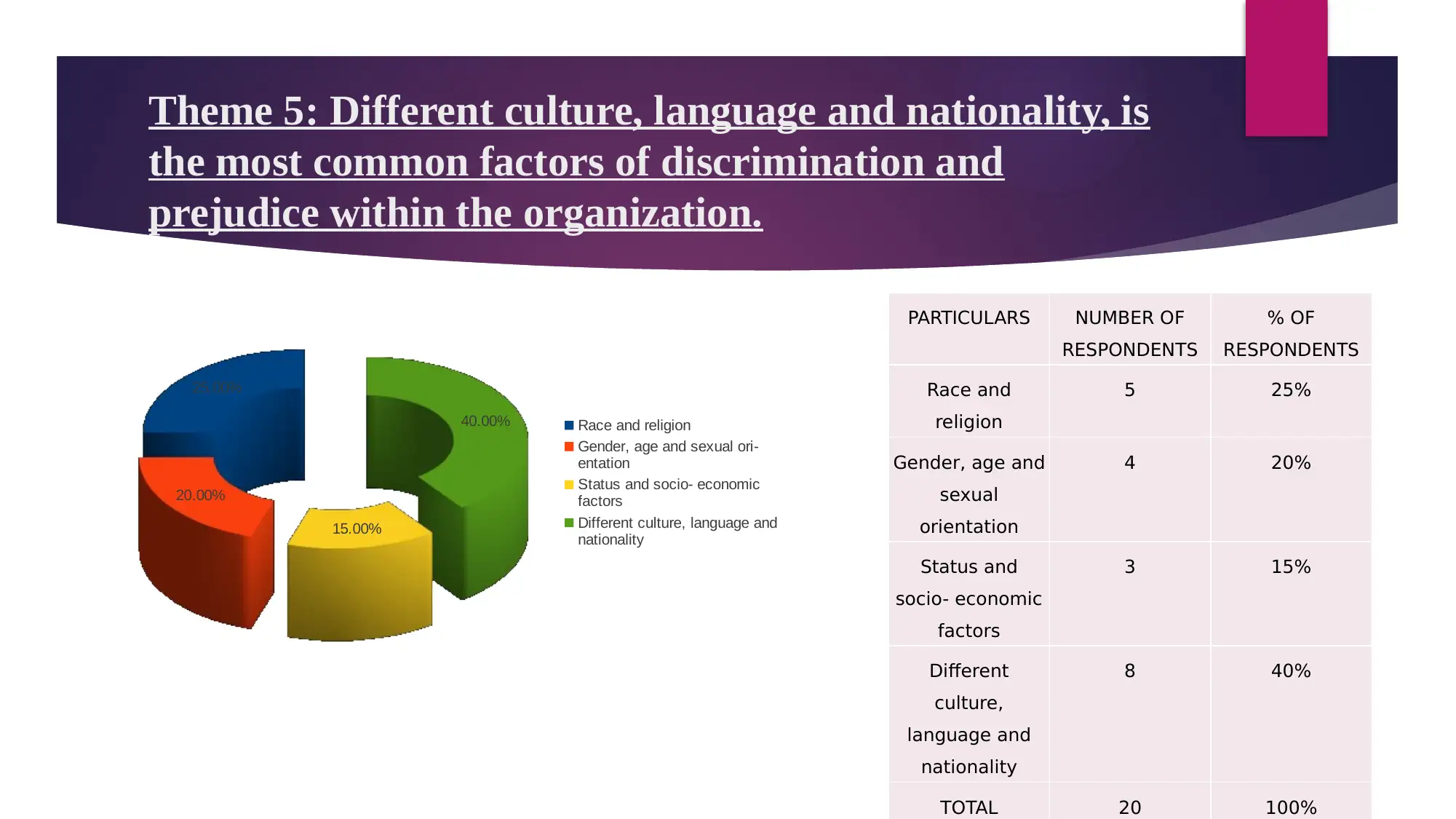
Theme 5: Different culture, language and nationality, is
the most common factors of discrimination and
prejudice within the organization.
PARTICULARS NUMBER OF
RESPONDENTS
% OF
RESPONDENTS
Race and
religion
5 25%
Gender, age and
sexual
orientation
4 20%
Status and
socio- economic
factors
3 15%
Different
culture,
language and
nationality
8 40%
TOTAL 20 100%
25.00%
20.00%
15.00%
40.00% Race and religion
Gender, age and sexual ori-
entation
Status and socio- economic
factors
Different culture, language and
nationality
25.00%
20.00%
15.00%
40.00% Race and religion
Gender, age and sexual ori-
entation
Status and socio- economic
factors
Different culture, language and
nationality
the most common factors of discrimination and
prejudice within the organization.
PARTICULARS NUMBER OF
RESPONDENTS
% OF
RESPONDENTS
Race and
religion
5 25%
Gender, age and
sexual
orientation
4 20%
Status and
socio- economic
factors
3 15%
Different
culture,
language and
nationality
8 40%
TOTAL 20 100%
25.00%
20.00%
15.00%
40.00% Race and religion
Gender, age and sexual ori-
entation
Status and socio- economic
factors
Different culture, language and
nationality
25.00%
20.00%
15.00%
40.00% Race and religion
Gender, age and sexual ori-
entation
Status and socio- economic
factors
Different culture, language and
nationality
Paraphrase This Document
Need a fresh take? Get an instant paraphrase of this document with our AI Paraphraser
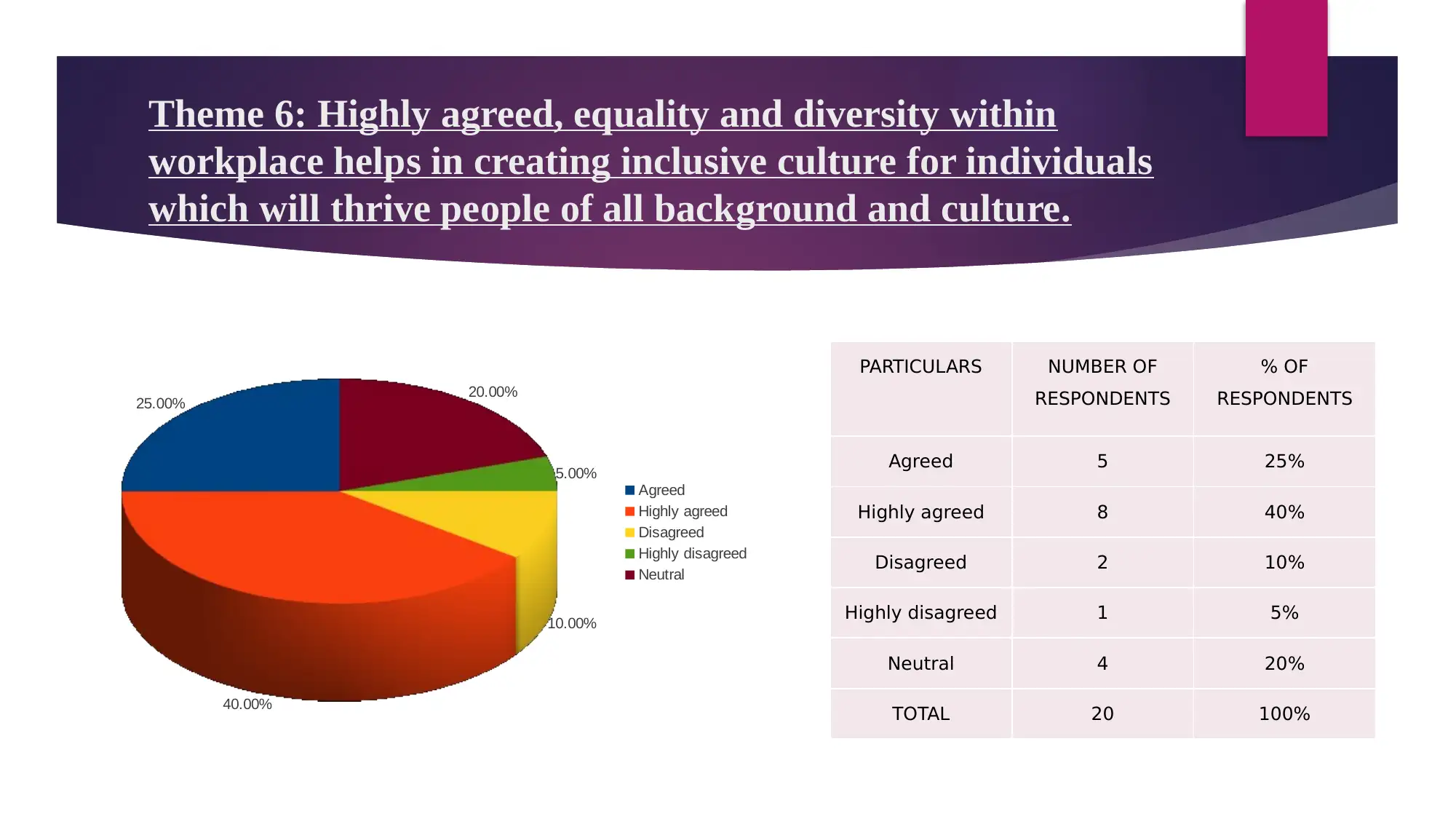
Theme 6: Highly agreed, equality and diversity within
workplace helps in creating inclusive culture for individuals
which will thrive people of all background and culture.
PARTICULARS NUMBER OF
RESPONDENTS
% OF
RESPONDENTS
Agreed 5 25%
Highly agreed 8 40%
Disagreed 2 10%
Highly disagreed 1 5%
Neutral 4 20%
TOTAL 20 100%
25.00%
40.00%
10.00%
5.00%
20.00%
Agreed
Highly agreed
Disagreed
Highly disagreed
Neutral
25.00%
40.00%
10.00%
5.00%
20.00%
Agreed
Highly agreed
Disagreed
Highly disagreed
Neutral
workplace helps in creating inclusive culture for individuals
which will thrive people of all background and culture.
PARTICULARS NUMBER OF
RESPONDENTS
% OF
RESPONDENTS
Agreed 5 25%
Highly agreed 8 40%
Disagreed 2 10%
Highly disagreed 1 5%
Neutral 4 20%
TOTAL 20 100%
25.00%
40.00%
10.00%
5.00%
20.00%
Agreed
Highly agreed
Disagreed
Highly disagreed
Neutral
25.00%
40.00%
10.00%
5.00%
20.00%
Agreed
Highly agreed
Disagreed
Highly disagreed
Neutral
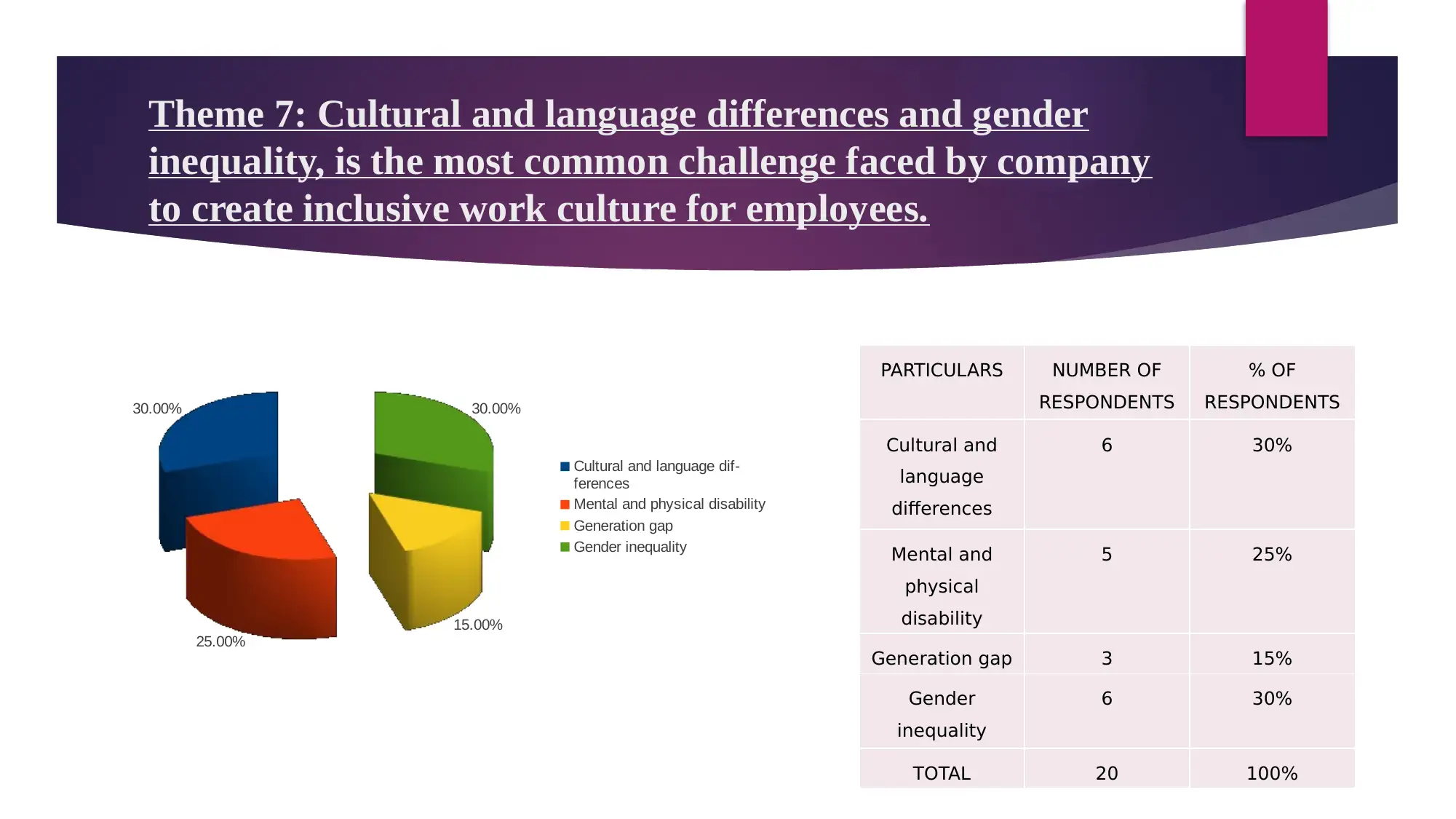
Theme 7: Cultural and language differences and gender
inequality, is the most common challenge faced by company
to create inclusive work culture for employees.
PARTICULARS NUMBER OF
RESPONDENTS
% OF
RESPONDENTS
Cultural and
language
differences
6 30%
Mental and
physical
disability
5 25%
Generation gap 3 15%
Gender
inequality
6 30%
TOTAL 20 100%
30.00%
25.00%
15.00%
30.00%
Cultural and language dif-
ferences
Mental and physical disability
Generation gap
Gender inequality
30.00%
25.00%
15.00%
30.00%
Cultural and language dif-
ferences
Mental and physical disability
Generation gap
Gender inequality
inequality, is the most common challenge faced by company
to create inclusive work culture for employees.
PARTICULARS NUMBER OF
RESPONDENTS
% OF
RESPONDENTS
Cultural and
language
differences
6 30%
Mental and
physical
disability
5 25%
Generation gap 3 15%
Gender
inequality
6 30%
TOTAL 20 100%
30.00%
25.00%
15.00%
30.00%
Cultural and language dif-
ferences
Mental and physical disability
Generation gap
Gender inequality
30.00%
25.00%
15.00%
30.00%
Cultural and language dif-
ferences
Mental and physical disability
Generation gap
Gender inequality
⊘ This is a preview!⊘
Do you want full access?
Subscribe today to unlock all pages.

Trusted by 1+ million students worldwide
1 out of 18
Related Documents
Your All-in-One AI-Powered Toolkit for Academic Success.
+13062052269
info@desklib.com
Available 24*7 on WhatsApp / Email
![[object Object]](/_next/static/media/star-bottom.7253800d.svg)
Unlock your academic potential
Copyright © 2020–2026 A2Z Services. All Rights Reserved. Developed and managed by ZUCOL.





